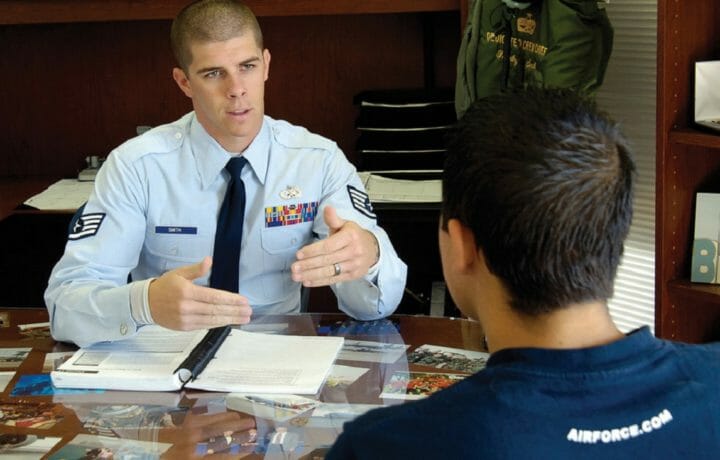The United States Air Force is adapting to the challenges presented by the COVID-19 outbreak. Earlier this month the Basic Military Training opted to temporarily graduate new Airmen in training week seven, which was accelerated from eight and a half weeks. This was necessary due to calls for social-distancing requirements across the training camps to ensure the safety and security of the trainees as well as the military training instructors, other active-duty members, and civilians and contractors that support the mission.
This week the Air Force even changed the way it finds new and diverse ways to ship applicants to basic military training. But the Air Force Recruiting Service has made one thing crystal clear – that COVID-19 would not get in the way of its mission.
“Today’s Air Force calls for our recruiting team to adapt to the constant changes in their current needs and requirements for each new ship week to basic military training,” said Capt Eric Roe, 364th Recruiting Squadron director of operations via a statement. “Our recruiting team must be ready to pivot, prioritize and match applicants to an optimal job and enter active duty date on a weekly and sometimes hourly basis.”
This has included agile shipping methods that AFRS has employed in the past.
“We’ve always had to be agile, make changes during shipping days,” said Master Sgt. Dana Bazile, 360th Recruiting Group operations officer. “For example, if an applicant’s health condition has changed at the last minute, this could delay their departure. Each week we’d see one or two applicants in this situation and we’d have to quickly adjust ship dates or switch to an applicant from another location.”
The Air Force already saw two Military Entrance Processing Stations (MEPS) closures just two days before shipments. AFRS has had to find ways to transport recruits to other MEPS to complete their final medical checks before going to BMT.
“We have to balance our (mission) to build and maintain the strength of the Air Force with the need for public safety, but we also have to understand that we have a promise of a career to these people joining our team,” Bazile added.
Changing Recruiting Tactics
Currently some 1,850 Air Force, Air Force Reserve and Air National Guard recruiters have also had to change the way they operate, and are working from home in all 50 states, as well as in Puerto Rico, the Virgin Islands, Great Britain, Germany, Italy, Guam and Japan. This has included a slightly more relaxed work environment where recruiters wear a uniform that often includes an Air Force polo shirt with khaki slacks, and also new ways to connect.
Instead of the old school handshakes and in-person contact, COVID-19 has made it all about digitally connecting with recruits.
This is important, because as of the end of March, four recruits had tested positive for coronavirus. The service has been dealing with the delicate balance that requires training new airmen while stopping the fast-spreading virus.
“Technology has allowed us as recruiters to maintain our relationships with our applicants and DEPers,” said Tech. Sgt. Charles Giertz, a 317th Recruiting Squadron enlisted accessions recruiter. “It has been the unbelievable receptiveness of the applicants to flex to this new way of doing things that has made this transition as seamless as possible. Their understanding and willingness to adhere to the ever flowing changes coming down from AFRS has been nothing short of amazing and has me so excited to see where they take our Air Force!”



